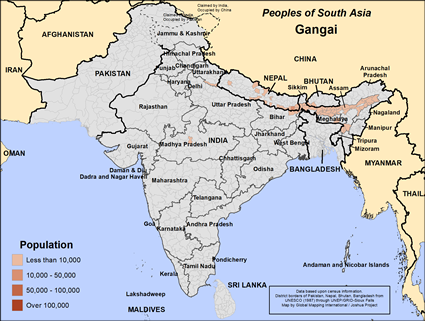Gangai in India

Photo Source:
Sagar Ganesh
|

Map Source:
People Group data: Omid. Map geography: UNESCO / GMI. Map Design: Joshua Project.
|
| People Name: | Gangai |
| Country: | India |
| 10/40 Window: | Yes |
| Population: | 5,300 |
| World Population: | 45,300 |
| Primary Language: | Nepali |
| Primary Religion: | Hinduism |
| Christian Adherents: | 0.00 % |
| Evangelicals: | 0.00 % |
| Scripture: | Complete Bible |
| Ministry Resources: | Yes |
| Jesus Film: | Yes |
| Audio Recordings: | Yes |
| People Cluster: | South Asia Hindu - other |
| Affinity Bloc: | South Asian Peoples |
| Progress Level: |
|
Introduction / History
Gangai people are divided into seven sub groups. Four of these live in Nepal. Others are represented in northeastern India.
What Are Their Lives Like?
Gangai are traditionally potters, but today most are farmers and weavers. Their clothing is different from surrounding people.
They live in joint families (many generations living under the same roof). All sons inherit an equal shares of parental property.
A Maithili Brahmin officiates at their marriage rituals.
Gangai have their own community council (called a panchayat), and minor disputes are settled by this council. Punishments include social boycott and a cash fine.
What Are Their Beliefs?
Gangai people are Hindu by religion, though a small number are Buddhists. They also worship ancestral gods as well as village and household deities.
What Are Their Needs?
Gangai people in India speak Nepali. Bible resources exist in Nepali, but Gangai people remain unreached. Who will bring resources to them?
Their worship of many gods might fill an emotional need, but it cannot touch their genuine spiritual need.
Prayer Points
Pray that main members of the Gangai families become followers of Christ and then
lead the other family members to the Savior.
Pray that Gangai people will be liberated by God's Holy Spirit from the many ties that bind them, and false deities that weigh them down, causing them to live in fear and misery.
Pray that the Holy Spirit of the one true God will enable them to experience His full
payment of the penalty for their sins.